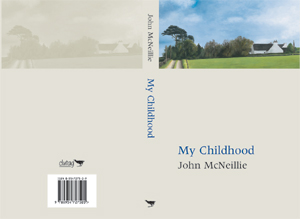My Childhood
pp148. Thame: Clutag. £20.
0954727509
John McNeillie is better known as Ian Niall, under which pen name he became a major figure in British nature writing of the twentieth century. A Scotsman who ended up living in North Wales, McNeillie wrote more than forty books, mostly on rural themes. He was, notes his son (the poet Andrew McNeillie) in the introduction to My Childhood, “a kind of lyric poet in prose, and an elegist who had known Eden”. That Eden was North Clutag Farm, a remote steading in Wigtownshire in the Scottish borders, where McNeillie grew up under the care of his grandparents in the late 1910s and 20s. It is these years that are the subject of My Childhood – a previously unpublished work, and a minor masterpiece of rural memoir.
Seamus Heaney, an admirer of My Childhood, has described the Clutag farm as an “alternative Mossbawn”; the farm in County Derry on which Heaney was raised, and which he has mapped and elegized so lovingly in his poetry and essays. Certainly, there is an affinity between these two poetic parishes, consisting most obviously in the mode of rememberance – a simple but sharp-edged tone that rhymes with the type of life being recalled. There is, too, the same affection for single colours (green grass, white walls) and functional objects (grain scoops, peat spades, water pumps), and the same belief in the significance of touch and labour – of “heft” and “graft” – as ways of experiencing the world. Finally, Heaney and McNeillie both share a confidence in parochialism. “I firmly believed that there was nothing in the whole world worth going beyond our march wall to see”, declares McNeillie early in My Childhood, and nothing he discovers in its course convinces him that this might be a naive assumption.
The book is divided into twenty-one short chapters, each of which covers a different aspect of existence on the farm. McNeillie is good on the simple sensuality of childhood – a retired governess called Miss Dunbar comes to tea “reeking of mothballs and paraffin, dressed in her best black dress”, and on the limitless adventures a child can have in woods and fields. But he also catches at the subtle spiritual dimension to the labouring life; the consolation of the “glow of the oil-lamp burning in the window” at the end of a long working day, or of “the scent of peat smoke filling the sitting-room on a winter’s evening”. The book’s ending is a beautifully cadenced fall into experience, which describes the death of McNeillie’s grandfather, and McNeillie’s subsequent departure from his Eden.
In the way it demarcates and celebrates it’s parish, and in the calm brightness of the writing, My Childhood avoids the sepia tone of so much contemporary childhood memoir. It also offers a valuable reminder, in this ironic age, of the considerable cumulative power of sincerity as a writing mode. Above all, perhaps, it testifies to the mixed blessings of a country up-bringing: the free, subtle and ceaseless psychotherapy which the memory of those years provides, and the powerful attacks of nostalgia and yearning to which they leave one vulnerable.
Robert MacFarlane

